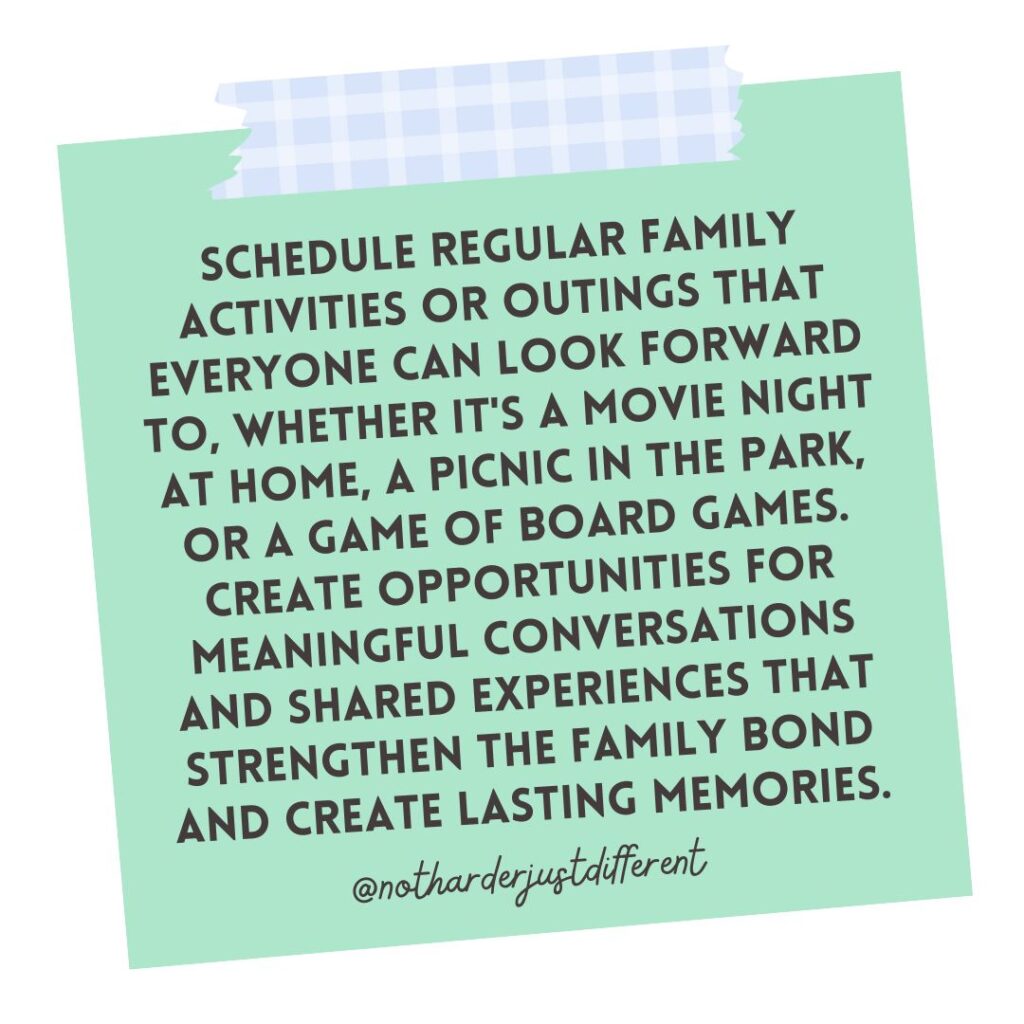Disclaimer: As a future Licensed Clinical Social Worker (LCSW) currently pursuing my master’s degree, I am passionate about sharing insights and information related to parenting, autism and homeschooling based on my personal experiences and research. However, the content shared on this blog is not intended to substitute professional advice, diagnosis, or treatment. Parenting is a deeply personal journey, and while I strive to provide valuable insights, every family and situation is unique. Readers are encouraged to consult with qualified professionals for personalized guidance tailored to their specific needs and circumstances.
Let’s chat about something super important: balancing chronic illness and family life. We know it’s not always easy juggling doctor’s appointments, symptom flares, and family responsibilities, but fear not! With a few handy tips and tricks, you can keep the harmony flowing in your household, even when life throws you a curveball.
Living with a chronic illness can impact every member of the family, from the little ones who might not understand why mom or dad isn’t feeling well to the spouse who’s doing their best to pick up the slack. It’s like trying to juggle a dozen eggs without breaking any—tricky, right? But with a bit of patience, communication, and support, you can create a family dynamic that’s resilient, compassionate, and filled with love.

5 Tips for a Happy Household
Open Communication
Communication is the glue that holds families together, especially when navigating the ups and downs of chronic illness. Make sure everyone feels comfortable expressing their thoughts and feelings openly and honestly. Encourage regular check-ins where family members can share how they’re feeling and any concerns they might have. Be patient and listen attentively, validating each other’s experiences and offering support without judgment. Remember, communication is a two-way street, so be sure to not only express your own needs but also take the time to understand the needs of your loved ones.
Tips for Open Communication:
- Regular Family Meetings: Schedule regular family meetings to discuss any upcoming appointments, changes in treatment plans, or other important matters related to the chronic illness. This ensures that everyone is on the same page and can offer support where needed.
- Use “I” Statements: Encourage the use of “I” statements when expressing feelings or concerns. For example, instead of saying, “You never help around the house,” try saying, “I feel overwhelmed when I have to do all the housework by myself.”
- Active Listening: Practice active listening during conversations, focusing on what the other person is saying without interrupting or jumping to conclusions. Repeat back what you heard to ensure understanding and show empathy.
- Encourage Questions: Create a safe space where family members feel comfortable asking questions about the chronic illness. Provide age-appropriate explanations and reassurance, addressing any concerns with patience and understanding.
- Seek Professional Support: Consider family therapy or counseling to improve communication skills and address any underlying issues related to the chronic illness. A professional can provide guidance and support in navigating difficult conversations and strengthening family bonds.
Shared Responsibilities
In a household affected by chronic illness, sharing responsibilities is essential for maintaining harmony and reducing stress. Assign tasks and chores to each family member based on their abilities and availability, ensuring that no one person bears the brunt of the workload. Encourage teamwork and collaboration, emphasizing the importance of supporting each other through both the good times and the challenging ones. By sharing responsibilities, you not only lighten the load but also foster a sense of unity and togetherness within the family.
Tips for Shared Responsibilities:
- Create a Chore Chart: Develop a chore chart or schedule that outlines the tasks and responsibilities for each family member. Rotate chores regularly to ensure fairness and prevent anyone from feeling overwhelmed by the same tasks week after week.
- Set Realistic Expectations: Be realistic about what each family member can reasonably accomplish given their age, abilities, and other commitments. Adjust expectations as needed and be flexible in redistributing tasks when necessary.
- Celebrate Achievements: Acknowledge and celebrate each family member’s contributions to the household. Whether it’s completing a chore without being asked or going above and beyond to help out, take the time to express gratitude and praise for their efforts.
- Lead by Example: Lead by example by actively participating in household tasks and demonstrating a positive attitude toward sharing responsibilities. Children learn by observing their parents, so modeling a cooperative and collaborative approach sets a powerful example for them to follow.
- Hold Family Meetings: Use family meetings as an opportunity to discuss household responsibilities and make any necessary adjustments to the chore schedule. Encourage open communication and problem-solving to address any challenges that arise and ensure that everyone feels heard and valued.

Quality Time
Amidst the busyness of everyday life and the challenges of chronic illness, carving out quality time for the family is crucial for maintaining strong bonds and fostering a sense of connection. Schedule regular family activities or outings that everyone can look forward to, whether it’s a movie night at home, a picnic in the park, or a game of board games. Create opportunities for meaningful conversations and shared experiences that strengthen the family bond and create lasting memories.
Tips for Quality Time:
- Designate Family Nights: Set aside specific days or evenings each week for designated family time. Whether it’s a Friday pizza night or a Sunday afternoon hike, having regular family nights ensures that everyone has something to look forward to and provides a consistent opportunity for bonding.
- Unplug and Disconnect: Make a conscious effort to unplug from technology and distractions during quality time together. Put away smartphones, turn off the TV, and focus on being present with each other. Engage in activities that encourage interaction and communication, such as playing board games or cooking a meal together.
- Rotate Activity Choices: Allow each family member to take turns choosing the activity for quality time. This not only ensures that everyone gets to participate in something they enjoy but also fosters a sense of inclusivity and cooperation within the family.
- Create Traditions: Establish family traditions or rituals that hold special meaning for your family. Whether it’s a yearly camping trip, a holiday baking day, or a weekly family movie marathon, these traditions create a sense of continuity and belonging that strengthens family bonds over time.
- Be Present and Engaged: Make an effort to be fully present and engaged during quality time with your family. Put aside distractions and focus on listening, connecting, and enjoying each other’s company. Show genuine interest in each other’s lives and experiences, and create a supportive and nurturing environment where everyone feels valued and loved.
Educating Family and Friends
Educating family and friends about the specific chronic illness affecting your family is crucial for fostering understanding, empathy, and meaningful support. Start by initiating open and honest conversations about the condition, explaining its symptoms, treatments, and potential impact on daily life. Provide educational resources, such as articles, books, or reputable websites, to help loved ones gain a deeper understanding of the illness and its effects. Encourage questions and create a safe space for discussion, where everyone feels comfortable sharing their thoughts and concerns. By raising awareness and increasing knowledge about the chronic illness, you can empower family and friends to offer more effective support and become valuable allies in your journey toward health and well-being.
Tips for Educating Family and Friends:
- Share Personal Experiences: Share your own experiences and insights about living with the chronic illness with family and friends. Offer honest and relatable anecdotes that help them understand the day-to-day challenges you face and the ways they can offer meaningful support.
- Encourage Research: Encourage family and friends to do their own research about the chronic illness to deepen their understanding and empathy. Provide recommendations for reputable sources of information, such as medical websites, research studies, and patient advocacy organizations.
- Lead by Example: Lead by example by being open and proactive about discussing the chronic illness with others. Be patient and understanding when answering questions or addressing misconceptions, and demonstrate gratitude for the support and efforts of your loved ones to educate themselves.
- Host Informational Sessions: Organize informal gatherings or virtual meetings where you can share information about the chronic illness with family and friends. Use visual aids, personal anecdotes, and guest speakers, if possible, to make the information more engaging and accessible.
- Provide Written Materials: Offer pamphlets, brochures, or informational handouts about the chronic illness to family and friends who are interested in learning more. Include basic facts, common symptoms, treatment options, and tips for supporting someone with the condition.
Creating a Support Network
Building a strong support network is essential for families navigating the challenges of chronic illness. Start by reaching out to friends, family members, and community organizations who may offer understanding and assistance. Share your experiences openly and honestly, inviting others to join you on your journey and offering support in return. Cultivate relationships with individuals who demonstrate empathy, compassion, and a willingness to lend a helping hand when needed. By surrounding yourself with a supportive network of people who genuinely care about your well-being, you can find comfort, encouragement, and practical assistance in times of need.
Tips for Creating a Support Network:
- Identify Potential Supporters: Make a list of friends, family members, neighbors, and coworkers who may be willing to offer support during difficult times. Reach out to them individually to discuss your situation and express your need for assistance.
- Join Support Groups: Consider joining local or online support groups for individuals and families affected by the same chronic illness. These groups provide a sense of community, shared understanding, and valuable resources for coping with the challenges of the condition.
- Communicate Your Needs: Be clear and specific about the type of support you need from your network, whether it’s practical assistance with household tasks, emotional support through difficult times, or simply someone to listen without judgment.
- Offer Reciprocal Support: Remember that support networks are a two-way street. Be willing to offer support and assistance to others in your network when they need it, fostering a sense of reciprocity and mutual care.
- Explore Professional Resources: Don’t hesitate to seek support from healthcare professionals, therapists, or social workers who specialize in chronic illness management. These professionals can offer guidance, resources, and additional support to help you navigate the challenges you face.
Navigating chronic illness within the context of family life is undoubtedly challenging, but it’s also an opportunity to cultivate resilience, strengthen bonds, and find moments of joy amidst the chaos. By prioritizing open communication, sharing responsibilities, and carving out quality time together, families can weather the storms of chronic illness with grace and resilience. Educating family and friends, creating a supportive network, and seeking professional resources are essential components of building a strong foundation for managing the challenges ahead. Remember, you’re not alone in this journey. With love, support, and a little bit of laughter, you can overcome any obstacle that comes your way. Together, as a family, you can thrive, even in the face of chronic illness.

